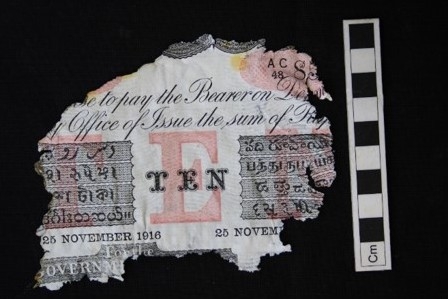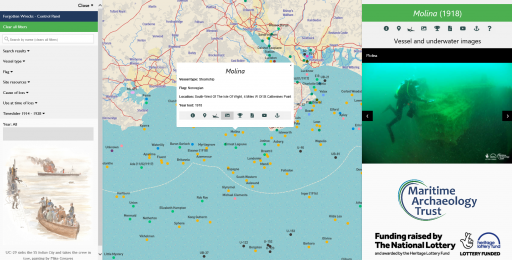The Maritime Archaeology Trust has released an interactive map, bringing together the results of its four year investigation into hundreds of WW1 shipwreck sites off England’s south coast.
Through a combination of fieldwork, research, exhibitions and outreach for the Centenary, MAT aimed to highlight ‘the vital, yet little known, struggle’ that took place daily in the crucial shipping lanes of the Channel.
The project area covered 1,130 wrecks and 39 coastal installations – including ocean liners, merchant vessels, trawlers, troop and hospital ships, submarines, as well as harbours, piers, seaplane bases, and wireless stations.

Bathymetric image of HMHS Warilda, a hospital ship torpedoed with the loss of 223 passengers and crew – including 101 patients – while crossing from Le Havre to Southampton on 3 August 1918 (Image © MAT)
‘The scale and variety of this First World War maritime archaeology reflects the singular importance of the war at sea,’ MAT says. Britain’s war effort depended on shipping, not only for moving troops and munitions, but also keeping the country supplied with food and other essentials. Germany, under blockade by the Royal Navy, attacked these lifelines with its U-boats.
Now fragile after 100 years, and largely overlooked with the passage of time, the sites have been recorded as a legacy of the WW1 Centenary.
Together with archival and archaeological research, personal and family histories have also been studied to shed light on the human stories of the ships’ crews and their communities.

A freshly-minted 10 Rupee note recovered from SS Camberwell, sunk by a mine east of the Isle of Wight in May 1917, en route from London to Calcutta (Image © MAT)
The Maritime Archaeology Trust has now made the findings accessible for free through its interactive online map – see Forgotten Wrecks of the First World War. As part of the UK Lottery-funded ’Forgotten Wrecks’ project, MAT held 44 exhibitions during the 2014-18 Centenary, attracting more than half a million visitors. All of this work has been possible, it says, thanks to a team of 322 volunteers.
German warship wrecks found in Portsmouth Harbour
SS Mendi bell displayed on the Isle of Wight – September 2017.
First US WW1 destroyer loss commemorated for Centenary.
1918 convoy tragedy remembered.
First World War shipwrecks revealed in 3d.
© Images courtesy of Maritime Archaeology Trust
Posted by: CN Editorial Team
